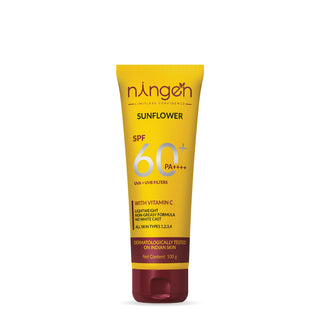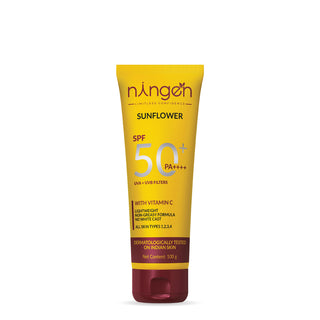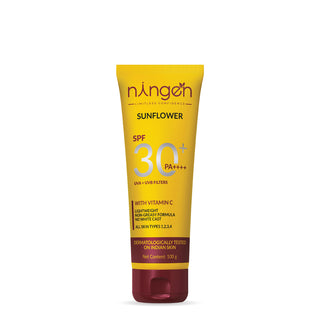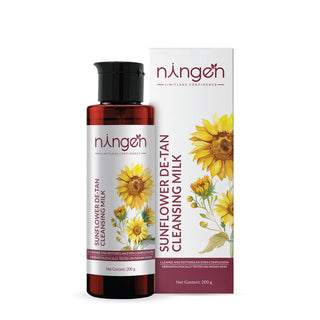Do you know that your skin acts as a barrier to protect your body from the environment? It is an essential component of healthy skin, which prevents water loss and protects against environmental aggressors such as pollution, UV radiation, and bacteria. This is why it is pivotal to know the ways and means to protect it.
What is a Skin Barrier?
It is the outermost layer of the skin, also known as the stratum corneum. It is composed of dead skin cells, lipids, and natural moisturizing factors that work together to form a protective barrier on the skin's surface. This barrier prevents moisture loss and protects against environmental stressors, pathogens, and toxins. It refers to the complex of lipids(fatty materials such as ceramides, fatty acids, and cholesterol) that is present between the cells in the corneum. This lipid barrier guards moisture and protects against dehydration and it also prevents irritants from entering the skin.
Importance of Skin Barrier
The skin barrier is crucial for maintaining healthy skin. It plays a significant role in keeping the skin hydrated, protecting it from harmful substances, and preventing infections. If the skin barrier is compromised, it can lead to a range of skin problems, such as dryness, irritation, sensitivity, and even infections.
What can damage your skin barrier?
- Extreme weather conditions especially cold, heat, dry air and wind can damage the lipids in the barrier.
- Sun exposure can cause an impaired barrier function.
- Unprotected skin in winters will have a strong tendency to become dehydrated due to destruction of barrier lipids.
- Harsh cleansers unsuitable for your skin type can damage the barrier. Besides, high foaming detergent cleansers can strip the skin of protective sebum. Then it slowly begins stripping the fats within the barrier function.
- Over exfoliation can strip too many surface corneum cells and along with these cells the barrier lipids are also depleted.
What are the symptoms of impaired barrier function?
Impaired barrier function can affect sensitivity, inflammation, skin dryness, hyperpigmentation from inflammation and aging symptoms
Here are some common symptoms of an impaired barrier function;
- Flaking: It shows that your skin is dehydrated.
- Tightness: It is a sensation that occurs when the barrier has been damaged, such as the feeling of tightness of the body skin that may be experienced after a soapy or hot bath.
- Redness: Inflammation that often occurs because the barrier is unable to protect against irritants penetrating the skin.
- Itchiness : Winter itch is classic barrier function damage. The damaged barrier function affects nerve endings, causing itching. When the dehydrated skin is scratched to relieve the itching.
- Stinging: It may result from irritants easily penetrating the skin and inflaming the nerve endings.
Does the barrier function affect the aesthetic appearance of your skin?
- If the barrier is fully intact and healthy, the skin will hold moisture well, which makes skin look more supple, firmer, and younger.
- Impaired barrier function can make your skin look more chapped and more wrinkled with many fine lines. Deep wrinkles and expression lines are accentuated. Skin with poor barrier function is often said to look somewhat deflated.
- Impaired barrier function can also lead to redness due to irritant reactions . The redness associated with rosacea and sensitive skin is often related to impaired barrier function.
How to Protect Your Skin Barrier?
Protecting the skin barrier is essential for maintaining healthy skin. Here are some tips to help protect your skin barrier;
- Avoid Over-cleansing: Over-cleansing can strip the skin of its natural oils, leading to dryness and irritation. Use a gentle cleanser and avoid harsh scrubs and exfoliants.
- Moisturize: Moisturizing is essential to keep the skin hydrated and protect the skin barrier. Choose a moisturizer that is appropriate for your skin type and apply it regularly.
- Use Sunscreen: UV radiation can damage the skin barrier and lead to premature aging. Use a broad-spectrum sunscreen with an SPF of at least 30 to protect your skin from harmful UV rays.Check out Ningen SPF 30 Sun Care Cream.
- Avoid Hot Water: Hot water can strip the skin of its natural oils and lead to dryness and irritation. Use lukewarm water when washing your face or showering.
- Use Humidifier: Low humidity can dry out the skin and damage the skin barrier. Use a humidifier to add moisture to the air and prevent skin dryness.
- Avoid Harsh Chemicals: Harsh chemicals in skincare products can damage the skin barrier and cause irritation. Look for products with gentle ingredients and avoid products that contain alcohol, fragrance, and sulfates.
How to Improve the Barrier Function of your Skin?
- As we age, our skin's barrier function is affected by both intrinsic and extrinsic factors. The cell renewal cycle slows down, sun exposure and inflammation cause damage. This damage can result in dry, flaky, and dehydrated skin, as well as wrinkles and elastosis.
- Restoring the skin's barrier function can make a huge difference in its appearance. With a healthy barrier, skin is smoother, more supple, and better hydrated. It also looks firmer and is less likely to show signs of inflammation or redness. So if you want to keep your skin looking youthful and healthy, focus on restoring and maintaining its barrier function.
Here are some points to improve your skin’s barrier function;
- To prevent over stripping the skin's protective barrier, it's best to use gentle cleansers. If you cleanse too frequently or over-cleanse, you risk stripping the protective sebum layer and damaging the barrier lipids between epidermal cells. Look for cleansers that foam lightly or not at all, as this indicates a low level of detergent content. For dry aging skin types, a cleanser designed for sensitive skin and tested for irritancy would be a great option. Try Ningen Sunflower De tan Cleansing Milk.
- To improve your skin's barrier function, use products infused with lipids. These products mimic or substitute for the natural barrier lipids, patching up any damage. The complex of sphingolipids, phospholipids, fatty acids, and cholesterol in these products is similar to the natural lipid matrix. You can find this complex in moisturizers, sunscreens, eye creams, masks, and intensive serums. For those with dry skin, lipid-infused products are an excellent choice.
- Want to restore your skin's natural cell renewal cycle? Try using alpha hydroxy acids (AHA). AHA helps remove dead, dry surface cells and stimulates their replacement, which produces barrier lipids. By doing this, AHA helps repair your skin's natural barrier. Studies have shown significant improvement in barrier repair when using AHA.
What is a broken skin barrier?
- When the outer layer of the skin, also called the stratum corneum, is damaged, weakened or compromised, it is known as a broken skin barrier. This can cause the skin to lose its ability to retain moisture, protect against environmental stressors, and prevent irritants and bacteria from penetrating the skin.
- There are many reasons why the skin barrier can break. Over-cleansing, harsh chemicals, pollution, cold weather, and certain medical conditions can all cause damage. When the skin barrier is compromised, it can lead to many skin problems. These include dryness, flakiness, redness, itchiness, sensitivity, and inflammation.
- To restore your skin's natural protective function and prevent further damage, repairing a broken skin barrier is crucial. You can achieve this by using gentle skincare products, avoiding harsh chemicals and irritants, moisturizing regularly, using a humidifier in dry environments, and protecting your skin from UV radiation. In severe cases, a dermatologist may recommend prescription creams or other treatments to help restore your skin barrier. Don't wait until it's too late - take care of your skin now!
What happens when your skin barrier is broken?
When your skin barrier is damaged, it can lead to a range of skin issues which are as follows;
- Dryness: A damaged skin barrier can cause the skin to lose moisture, leading to dryness, flakiness, and roughness.
- Sensitivity: A weakened skin barrier can make the skin more susceptible to irritation and allergic reactions from environmental factors, skincare products, and other external stimuli.
- Inflammation: A damaged skin barrier can trigger an immune response, leading to inflammation, redness, and swelling.
- Acne: A weakened skin barrier can allow bacteria to penetrate the skin, leading to breakouts and acne.
- Premature aging: A damaged skin barrier can increase the skin's vulnerability to environmental stressors like pollution and UV radiation, leading to premature aging, fine lines, and wrinkles.
- Increased risk of infection: A weakened skin barrier can allow bacteria, viruses, and other pathogens to enter the skin, leading to infections and other health problems.
Overall, a damaged skin barrier can make the skin more vulnerable to a range of skin issues, and it is essential to take steps to repair and protect the skin barrier to maintain healthy skin.
What is Skin Barrier Damage?
- Skin barrier damage refers to a condition in which the outermost layer of the skin, known as the stratum corneum, is compromised, weakened or disrupted, resulting in a loss of the skin's protective function. The skin barrier is responsible for keeping the skin hydrated, protecting against environmental stressors, and preventing irritants and bacteria from entering the skin. When the skin barrier is damaged, it can lead to a range of skin issues, including dryness, flakiness, redness, itching, and sensitivity.
- Some common signs of skin barrier damage include skin dryness, redness, roughness, itching, and a feeling of tightness or discomfort.
- It is essential to repair the skin barrier to restore the skin's natural protective function and prevent further damage. This can be achieved by using gentle skincare products, avoiding harsh chemicals and irritants, moisturizing regularly, using a humidifier in dry environments, and protecting the skin from UV radiation.
Suffice to say that a healthy skin barrier is crucial for the overall health of your skin. You should use gentle moisturizing skincare products that will help to strengthen your skin barrier. By taking care of your skin barrier you can maintain healthy glowing skin for years to come.











